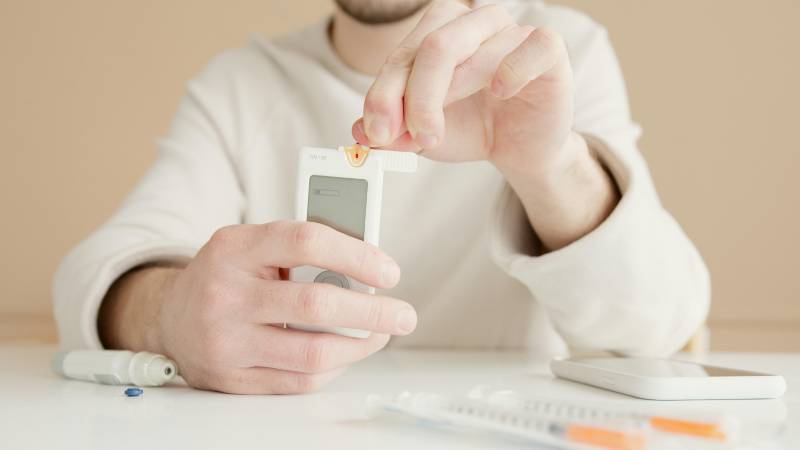
Blockchain in Healthcare: Securing Patient Data
10 min read
14 Oct 2025
Introduction
Blockchain technology is transforming the healthcare industry by providing secure, transparent, and tamper-proof systems for managing patient data. Traditional healthcare systems often face issues of data breaches, fragmented records, and lack of interoperability. Blockchain offers a decentralized approach that ensures privacy while enabling seamless access to authorized medical professionals. By 2025, blockchain is expected to play a critical role in patient data management, clinical trials, and health research, driving both efficiency and trust in healthcare systems worldwide.
How Blockchain Secures Patient Data
Blockchain uses cryptographic techniques and a distributed ledger to store medical records across multiple nodes. Each transaction is recorded permanently, ensuring that records cannot be altered or deleted without consensus. This guarantees data integrity, transparency, and accountability, which is essential for sensitive healthcare information.
Key Applications in Healthcare
- Secure electronic health records (EHRs) accessible only by authorized users
- Tracking pharmaceuticals to prevent counterfeit drugs
- Managing consent and patient permissions for data sharing
- Facilitating clinical trials by ensuring transparent and verifiable data
- Enabling telemedicine with secure patient information exchange
- Integration with AI for predictive analytics and personalized treatments
Benefits of Blockchain in Healthcare
Blockchain improves patient data security, reduces administrative costs, and enhances interoperability between healthcare providers. Patients gain more control over their data, while providers benefit from accurate and up-to-date medical information. Additionally, blockchain can enhance billing, claims processing, and insurance verification, reducing fraud and inefficiencies.
Advantages
- Enhanced data privacy and security
- Reduced risk of data breaches
- Streamlined data sharing between hospitals and clinics
- Improved patient trust and engagement
- Faster insurance claims and reduced administrative burden
- Reliable tracking of pharmaceuticals and supply chains
Challenges and Limitations
Despite its benefits, blockchain adoption in healthcare faces challenges such as high implementation costs, scalability issues, interoperability concerns, and the need for regulatory compliance. Educating healthcare providers and patients about blockchain is also crucial to ensure successful adoption.

Future Outlook
As blockchain technology matures, it is expected to play a larger role in patient data management, insurance claims processing, medical research, and clinical trials. Integration with AI and IoT devices will further enhance predictive analytics, personalized care, and real-time monitoring. By 2025, blockchain could become the standard for securing patient data globally, providing a reliable, transparent, and efficient healthcare ecosystem.
FAQs
How does blockchain protect patient data?
Blockchain secures patient data using decentralized ledgers and cryptographic encryption, preventing tampering or unauthorized access. Each transaction is immutable and time-stamped, creating transparency and accountability. Patients and healthcare providers can trust that sensitive records remain secure, verifiable, and private. This enhances confidence in digital health systems, reducing risks of breaches while ensuring long-term data integrity across platforms.
Can blockchain improve healthcare interoperability?
Yes, blockchain enables secure, real-time sharing of patient records across multiple healthcare providers. Its decentralized structure ensures interoperability without compromising privacy. Providers can access consistent, accurate medical information while patients maintain consent and control. This reduces duplication, errors, and delays, ultimately improving care coordination, efficiency, and outcomes. Blockchain ensures seamless communication among systems that traditionally struggle with integration issues.
What are the challenges of implementing blockchain in healthcare?
Challenges include high costs, scalability limitations, and the absence of universal standards across systems. Regulatory compliance adds complexity, and healthcare professionals may lack the technical expertise needed. Pilot programs and proper planning are critical to adoption. Overcoming these obstacles requires collaboration between healthcare providers, governments, and technology companies to develop practical, secure, and standardized blockchain solutions for widespread use.
How can patients benefit from blockchain?
Blockchain empowers patients with greater control over their health records. They can securely share data with providers while maintaining privacy. Benefits include quicker access to services, stronger trust in record integrity, and assurance against tampering. Patients also gain convenience when transferring records between hospitals. Ultimately, blockchain helps build a patient-centric healthcare ecosystem that prioritizes transparency, security, accessibility, and overall trustworthiness worldwide.
Will blockchain replace traditional healthcare databases?
Blockchain will likely complement rather than fully replace existing healthcare databases. Hybrid models may combine decentralized security and transparency with centralized infrastructure efficiency. This integration ensures smoother adoption while maintaining regulatory compliance and operational continuity. Over time, healthcare systems may lean toward blockchain for sensitive or high-value data, while retaining legacy databases for routine, large-scale, or non-critical administrative functions.
How does blockchain help prevent counterfeit drugs?
Blockchain secures pharmaceutical supply chains by recording every stage of drug production, shipping, and distribution. These records are immutable and tamper-proof, making it easy to verify authenticity. Patients and regulators can trace medicines back to the source, reducing counterfeit risks. This improves safety, builds trust, and strengthens global drug monitoring, ensuring patients receive genuine medications with guaranteed quality and transparency.
Can blockchain support telemedicine securely?
Yes, blockchain enhances telemedicine security by ensuring all shared data is encrypted, private, and verifiable. Patient consultations remain confidential while guaranteeing data integrity and authenticity. It builds trust between patients and doctors, especially in remote or digital care. This technology supports secure communication, reliable record-keeping, and regulatory compliance, helping telemedicine evolve as a trusted and efficient model in modern healthcare.
What is the future of blockchain in clinical trials?
Blockchain ensures transparency and integrity in clinical trials by creating immutable records of research data. Regulators, researchers, and participants can verify results confidently. It prevents data manipulation, ensures compliance, and increases trust in outcomes. Future adoption will streamline approvals, enhance collaboration, and improve efficiency in trial management, making research more ethical, reliable, and transparent for the global medical community.
How does blockchain integrate with AI in healthcare?
Blockchain provides secure storage for sensitive patient data, ensuring integrity and privacy while AI analyzes it for insights. Together, they enable predictive diagnostics, personalized treatment plans, and real-time monitoring. AI delivers value from reliable data, while blockchain guarantees transparency and trust. This combination strengthens healthcare innovation, reduces risks, and enhances outcomes by merging advanced analytics with secure digital infrastructure worldwide.

The AR Breakthrough That Will Make Blockchain Transactions Simpler Than Ever!
5 min read | 11 Oct 2025
How AI Is Making Blockchain Smarter and Safer – The Inside Scoop!
7 min read | 10 Oct 2025
The Big Tech Twist: How VR Is Set to Disrupt Blockchain Like Never Before!
6 min read | 09 Oct 2025
Unlocking the Power of AR: How Augmented Reality Is Set to Revolutionize Blockchain!
7 min read | 08 Oct 2025More Articles

Tech Solutions for Accessibility: Enhancing Lives for People with Disabilities
4 min read | 17 Jun 2025

AI in Content Creation: From Writing to Visual Arts
4 min read | 16 Jun 2025

Tech Innovations in Supply Chain Management
5 min read | 15 Jun 2025

The Role of Technology in Renewable Energy Solutions
4 min read | 14 Jun 2025
More Articles

AI in Agriculture: Improving Crop Yield and Sustainability
4 min read | 10 Aug 2025

AI in Gaming: Creating Realistic Virtual Worlds
3 min read | 09 Aug 2025

AI and IoT: Enhancing Connectivity and Smart Devices
5 min read | 08 Aug 2025

AI and Cybersecurity: Defending Against Emerging Threats
5 min read | 07 Aug 2025
